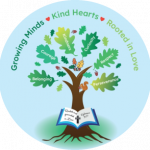“Growing Minds, Kind Hearts, Rooted in Love”

Our Curriculum
Subject Areas – Religious Education Vision
Note: For 2024-25 we are currently on Year B

Intent
Implementation
Suffolk’s Agreed Syllabus – ‘Where do I stand?’
The Agreed Syllabus wishes to:
- Acknowledge the breadth and diversity of worldviews, religious and non-religious, that pupils will encounter
- Establish an entitlement to excellent religious education for all pupils
- Promote continuity and coherence in R.E. in different phases of education
- Increase professional, parental and public understanding of R.E.
At Worlingham CEVC Primary School the implementation of the Agreed Syllabus aims to develop ‘religious literacy’ – a key skill needed given the vast range of religious and secular worldviews in our global society. Religious Literacy may be defined as the ability to ‘hold balanced and well-informed conversations about religion and belief’.
Implementing the Agreed Syllabus will:
- Provoke challenging questions about the ultimate meaning and purpose of life, beliefs about God, nature of reality, issues of right and wrong and what it means to be human
- Develop pupils’ understanding of Christianity and other principle religions in Britain
- Stimulate pupils’ curiosity about the diversity and impact of world views
- Challenge pupils to reflect on, analyse, interpret and evaluate issues
- Encourage pupils to develop their own sense of identity and belonging
- Prepare pupils for adult life
Time and Coverage
The syllabus requires study of Christianity in depth at each Key Stage to reflect that the religious traditions in Great Britain are, in the main, Christian. Study also includes the other principal religions of Britain as well as secular worldviews/philosophies e.g Humanism
Foundation Stage – 30 minutes per week equivalent
KS1 – minimum of 36 hours per year
KS2 – minimum of 45 hours per year
The syllabus requires:
- Well structured enquiries, which build on particular opportunities under the headings: Engage, Enquire, Explore, Evaluate, Express and Extend
Current research suggests R.E. in schools is better presented as a blend of academic disciplines, in particular theology, human and social science, philosophy, and that, when applied to learning in R.E., provide a more balanced picture of religions and worldviews, which in turn leads to better religious literacy.
Theology in R.E. involves enquiry into:
- Key beliefs/concepts of a religion or worldview
- Sources of authority for religious beliefs e.g sacred texts, religious leaders, divine revelation
- Particular beliefs about God, humanity, life and the nature of an after-life
- Differences in interpretation of key beliefs and changes in religious belief across time/culture
Human and Social Science in R.E. involves exploration of:
- Different customs, celebrations and rituals based on religious and secular beliefs
- The influence of sacred texts and religious leaders on communities
- Diverse interpretations of religious practices in different societies locally and globally, at different times
- Moral, ethical and practical lifestyle choices based on secular or religious worldviews
e.g. It’s more about what people say and do in relation to religious practice. Learn about Muslims, not Islam or learn about Christians and not Christianity.
Philosophy in R.E. involves engagement with:
- Ultimate questions of truth, morality, purpose and meaning of life
- Questions arising from religious and secular standpoints, texts or customs
- Conflicting answers offered by religious and non-religious groups and individuals
- Changes in questions/answers over time and across societies
Implementing the Emmanuel Project meets the needs of the Agreed Syllabus.

